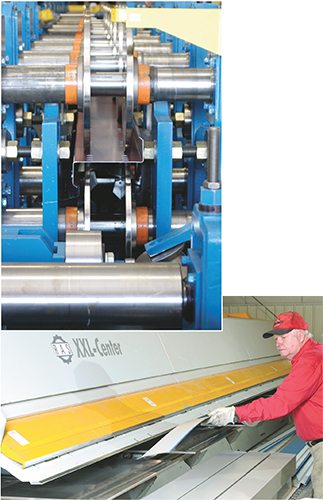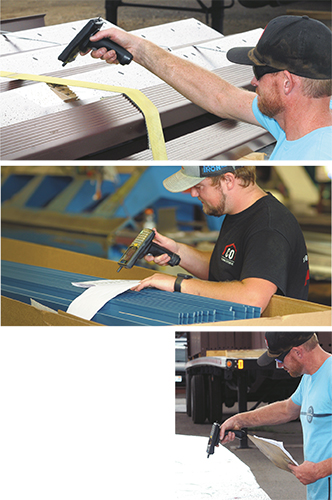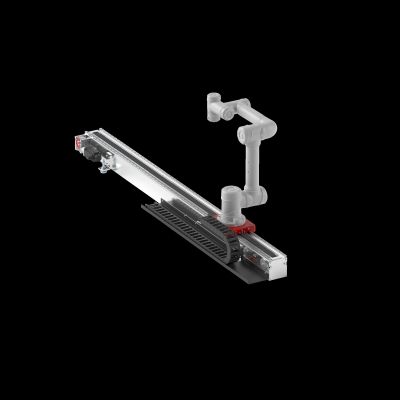Material Traceability, Inventory Tracking
December 1, 2017Comments
...are among the benefits this manufacturer of pre-engineered steel buildings realizes from its implementation of new ERP software. Software modules manage coil processing, shop-floor routing, work-order management and other functions.
An ERP system equipped to track sheetmetal coils throughout a product’s lifecycle “relieves you of the time-consuming paperchase…It prints coil tags upon receipt and allows you to reprint them at any time…and incorporates document imaging to store documents within the system and to attach them to each coil, so you can digitally look up Mill Test Reports and other important information instantaneously.”
Accurate Material and Part Flow
As each department within the operation handles a unique subset of each metal-building project (main framing, secondary framing and sheeting), the overall schedule through the shop requires production to be broken down into batches of parts for multiple jobs. Typically, each department produces parts in batches that encompass work for around eight different jobs. Then, the parts are parceled out by the unique job and loaded onto flatbed trailers for delivery to the job sites.
“Managing that flow of material and parts, ensuring that the right parts—and the right number of parts—ship to each job site can leave a lot of room for human error, when managed manually,” says CO Building Systems’ purchasing manager Matt Mitchell. With construction crews awaiting trailer loads on-the-clock at the job site, the last things an owner or contractor wants are inaccurate part bundles.“Managing flow through the shop,” Mitchell explains, “we create cut lists for each department, and track the resulting parts using a job number, piece mark, etc., and turn them into bundles. Those bundles then get loaded onto the trailers for delivery, and they must be accurate and complete to ensure timely onsite assembly.”
Double- and triple-checking cut lists and packaging can leave a lot of room for human error, and so early in 2014 the company sought an automated, software-driven process for managing its material flow, production, packaging and shipping functions. Its ERP system of choice: Adjutant, from Abis.
Knocking Down Barriers to Accuracy
One source of human error, prior to implementing Adjutant: loading the wrong coil of material onto a production line.“With Adjutant,” Mitchell explains, “operators scan the barcode tags attached to the coils, and the software matches the production-job recipe to the workpiece material. If the wrong coil has been cued up, an error code alerts the operators so that they do not proceed.”
“As the hardware packers build up the order, they scan the barcodes on each product,” Mitchell says. “Adjutant tracks the order and confirms that the packers include exactly what the order calls for. The accuracy is impeccable.”
The same is true when it comes time to load the trailers with bundles of parts—framing, subframing, hardware packages and sheeting. “For each bundle of components produced,” says Mitchell, “we use Adjutant to produce an ID tag with barcode, then use electronic scanning devices when we’re loading the trailers. The scans instruct our team on how to load the trailers, and then send the relevant data to our network so that we can track each bundle and its components. We record the quantity of parts, their length and other key parameters. Since introducing Adjutant into our process, and eliminating the human error inherent with our previously manual process, our trailer loads have become nearly perfect. Adjutant tracks everything that has been scanned for a particular shipping pallet and trailer load, compares that inventory to the original job order and ensures that nothing is forgotten or left out.”
Traceability Supports Building-Code Certification
Electronic material and master-coil traceability also ranks high on the list of fundamental ERP-software requirements, helping Mitchell and his management team to run a tight ship, “and to ensure that we meet the requirements of our IAS (International Accreditation Service) building-code certifications,” Mitchell says. “For example, when we process each master coil, Adjutant allows us to track backward to the source, all the way to the mill, for each part produced. All of the mill certifications and related documentation reside in an ‘electronic vault’ within Adjutant. That makes traceability, once a very time-consuming manual process that relied on operators making and filing notes, completely automated. That traceability then helps us maintain good standing with IAS and plays a huge role in helping us win new work.”With Adjutant, Abis offers numerous additional software modules developed specifically to support steel processing and made-to-order manufacturing, and Mitchell and his team continue to evaluate these options. Among them: Shop Floor Routing, CRM, Wireless Warehouse, Bill of Material and Work Order Management.
“One additional and valuable application within Adjutant,” says Mitchell, “involves work-order management and shop-floor control, to help us manage smaller orders, rather than large all-encompassing projects. Here, where maybe we need to manufacture just a handful of trim parts or sheeting, we use Adjutant to prepare the quotes and process the orders through the shop. Adjutant helps with these smaller jobs because it provides a window for our sales force into the inventory of parts we might already have on hand to satisfy a particular order. It provides visibility into our work flow. These types of jobs—partial orders that often will consume products already in inventory —represent 15 to 20 percent of our total volume, and we see, thanks in part to the capabilities of Adjutant, opportunities to grow this part of our business.
“We’re also, with Adjutant, able to collect real-time consumption reports,” Mitchell continues. With that type of visibility into its product flow, he says that the company can more accurately project what it needs to purchase, based on what it has already sold.
“Before,” he adds, “we were operating on ‘gut feel’ and asking managers to review and digest numerous handwritten reports. Knowing more precisely what we need to order, and when, allows us to create significant cost savings, compared to simply ordering the same amount of every material across the board, building an inventory of goods that we hope will sell in a timely manner.” MF
See also: Abis, Inc.
Technologies: Management










